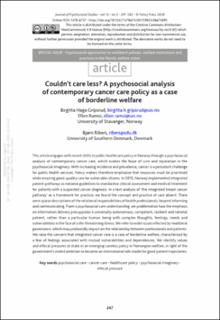| dc.contributor.author | Gripsrud, Birgitta Haga | |
| dc.contributor.author | Ramvi, Ellen | |
| dc.contributor.author | Ribers, Bjørn | |
| dc.date.accessioned | 2023-01-18T09:22:51Z | |
| dc.date.available | 2023-01-18T09:22:51Z | |
| dc.date.created | 2020-09-21T18:12:52Z | |
| dc.date.issued | 2020 | |
| dc.identifier.citation | Gripsrud, B. H., Ramvi, E., & Ribers, B. (2020). Couldn’t care less? A psychosocial analysis of contemporary cancer care policy as a case of borderline welfare. Journal of Psychosocial Studies, 13(3), 247-262. | en_US |
| dc.identifier.issn | 1478-6737 | |
| dc.identifier.uri | https://hdl.handle.net/11250/3044203 | |
| dc.description.abstract | This article engages with recent shifts in public healthcare policy in Norway through a psychosocial analysis of contemporary cancer care, which evokes the hope of cure and reparation in the psychosocial imaginary. With increasing incidence and prevalence, cancer is a persistent challenge for public health services. Policy makers therefore emphasise that resources must be prioritised while ensuring good-quality care for vulnerable citizens. In 2015, Norway implemented integrated patient pathways as national guidelines to standardise clinical assessment and medical treatment for patients with a suspected cancer diagnosis. In a text analysis of ‘the integrated breast cancer pathway’ as a framework for practice, we found the concept and practice of care absent. There were sparse descriptions of the relational responsibilities of health professionals, beyond informing and communicating. From a psychosocial care understanding, we problematise how the emphasis on information delivery presupposes a universally autonomous, competent, resilient and rational patient, rather than a particular human being with complex thoughts, feelings, needs and vulnerabilities in the face of a life-threatening illness. We refer to wider issues effected by neoliberal governance, which may profoundly impact on the relationship between professionals and patients. We raise the concern that integrated cancer care is a case of borderline welfare, characterised by a fear of feelings associated with mutual vulnerabilities and dependencies. We identify values and ethical pressures at stake in an emerging careless policy in Norwegian welfare, in light of the government’s stated ambition to become an international role model for good patient trajectories. | en_US |
| dc.language.iso | eng | en_US |
| dc.publisher | Policy Press | en_US |
| dc.rights | Navngivelse 4.0 Internasjonal | * |
| dc.rights.uri | http://creativecommons.org/licenses/by/4.0/deed.no | * |
| dc.subject | Psykososial omsorg | en_US |
| dc.subject | Psychosocial care | en_US |
| dc.subject | Psykososiale studier | en_US |
| dc.subject | Psychosocial Studies | en_US |
| dc.title | Couldn’t care less? A psychosocial analysis of contemporary cancer care policy as a case of borderline welfare | en_US |
| dc.type | Peer reviewed | en_US |
| dc.type | Journal article | en_US |
| dc.description.version | publishedVersion | en_US |
| dc.rights.holder | the authors | en_US |
| dc.subject.nsi | VDP::Annen kulturvitenskap: 069 | en_US |
| dc.subject.nsi | VDP::Other subjects within cultural studies: 069 | en_US |
| dc.source.pagenumber | 247-262 | en_US |
| dc.source.volume | 13 | en_US |
| dc.source.journal | Journal of Psychosocial Studies | en_US |
| dc.source.issue | 3 | en_US |
| dc.identifier.doi | 10.1332/147867320X15985348674895 | |
| dc.identifier.cristin | 1831877 | |
| dc.relation.project | Universitetet i Stavanger: In-10208 | en_US |
| cristin.ispublished | true | |
| cristin.fulltext | original | |
| cristin.qualitycode | 1 | |

